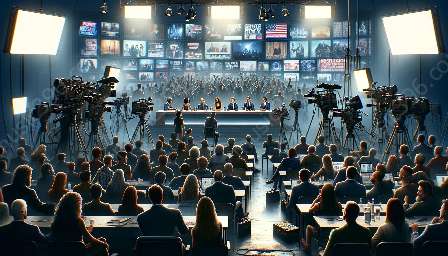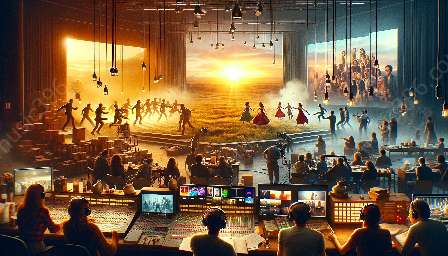Pop music has formed an integral part of both television and film, shaping and reflecting popular culture. This content explores the ethical representation of pop music in TV and film, its impact on society, and its portrayal in popular media. We delve into the ways in which pop music has been depicted and the potential ethical considerations that arise from its portrayal.
Exploring the Influence of Pop Music in Cinema and Television
Pop music has been a driving force in the entertainment industry, with its influence extending to the realms of cinema and television. From iconic musical performances to soundtracks that define an era, pop music has left an indelible mark on both mediums.
Portrayal of Pop Music in Film
In the realm of film, pop music has been utilized in various capacities to enhance storytelling and create emotional resonance. Whether through musical biopics that celebrate the lives of iconic musicians or through the inclusion of popular songs in movie soundtracks, pop music has been a key element in shaping audience experiences.
However, the ethical representation of pop music in film raises questions about authenticity, accuracy, and the responsibilities of filmmakers in portraying real-life artists and their legacies. Issues such as artistic integrity, historical accuracy, and the impact on the lives of musicians and their families come into play when depicting pop music in cinema.
Representation of Pop Music in Television
Television has also been a platform for the representation of pop music, from music-centered dramas and documentaries to reality shows that showcase the journey of aspiring artists. The portrayal of pop music in television raises ethical considerations regarding the exploitation of talent, the perpetuation of stereotypes, and the influence on audience perceptions.
The depiction of pop music in television can shape societal attitudes towards musicians, genres, and the industry as a whole. The ethical responsibilities of producers, directors, and network executives in creating and showcasing pop music content on television are integral in ensuring fair representation and positive impact.
Pop Music and Cultural Influence in TV and Film
Beyond its portrayal in cinema and television, pop music holds significant cultural influence, shaping societal norms, attitudes, and values. The representation of pop music in popular media can either perpetuate stereotypes and misrepresentations or serve as a platform for social change, inclusivity, and celebration of diversity.
Impact on Societal Perceptions
The ethical representation of pop music in TV and film directly influences societal perceptions of artists, genres, and cultural movements. The portrayal of pop music can either reinforce established narratives or challenge stereotypes, providing an opportunity for nuanced and authentic storytelling.
Furthermore, the legacy and impact of iconic musicians in popular culture are often subject to interpretation and manipulation in the media. Ethical considerations surrounding the preservation of artists' legacies, the fair representation of diverse voices, and the impact on audience perceptions are crucial in shaping the cultural landscape.
Diversity and Inclusivity
Pop music encompasses a wide spectrum of voices, styles, and identities, reflecting the diverse tapestry of human experiences. The ethical representation of pop music in TV and film should consider the importance of inclusivity, representation, and the amplification of marginalized voices within the industry.
By showcasing a broad range of musical talents, experiences, and perspectives, television and film can contribute to a more inclusive and equitable representation of pop music, fostering a deeper understanding and appreciation of diverse cultural expressions.
Addressing Ethical Considerations
As the intersection of pop music and popular media continues to evolve, addressing ethical considerations becomes paramount in ensuring fair and responsible representation. From the creative decisions of storytellers to the impact on societal attitudes, the ethical representation of pop music in TV and film plays a pivotal role in shaping cultural narratives and fostering meaningful discourse.
Empowering Authentic Storytelling
Empowering authentic storytelling in the portrayal of pop music involves honoring the lived experiences of artists, uplifting diverse voices, and challenging traditional narratives. By prioritizing authenticity and cultural sensitivity, television and film can uphold ethical standards while celebrating the rich tapestry of pop music and its cultural impact.
Advocating Responsible Production Practices
The ethical representation of pop music in TV and film extends to the production process, encompassing casting decisions, narrative choices, and the treatment of historical and contemporary musical figures. Advocating responsible production practices involves conscientious decision-making that respects the integrity and legacy of pop music icons and prioritizes inclusivity within the creative process.
Engaging in Meaningful Dialogue
Meaningful dialogue surrounding the ethical representation of pop music in TV and film involves fostering open discussions among industry professionals, audiences, and communities. By engaging in conversations about the impact of pop music portrayal on societal perceptions and cultural narratives, stakeholders can collectively work towards ethical and socially responsible representation.
Conclusion
The ethical representation of pop music and culture in TV and film holds significant implications for societal attitudes, cultural narratives, and the preservation of artistic legacies. By exploring the influence of pop music in cinema and television, addressing ethical considerations, and advocating for responsible representation, television and film can embrace their role as powerful platforms for shaping meaningful and inclusive storytelling.























